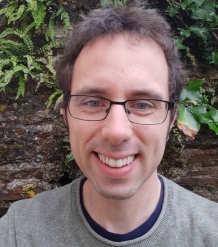Overview
I am a molecular biologist and bioinformatician broadly interested in molecular biology that underpins global-scale processes in the natural environment. After studying plant and microbial sciences at the University of Cambridge I did a PhD in plant genetics and metabolism at the John Innes Centre in Norwich. Since then I have spent a number of years at the Max-Planck Institute of Molecular Plant Physiology in Potsdam, studying how marine algae make mineralized cell walls.
I'm now excited to be working on the Lithium for Future Technology project. With Dr. Laura Newsome and Prof. Karen Hudson-Edwards. I will be focussing on the microbiology of Li reserves, particularly those in the brines of salars. We will investigate the microbial communities present in different environments within the salar hydrological systems to understand how microbial metabolism may contribute to the concentration and cycling of Li within the brines. Microcosm experiments will allow us to investigate in more detail how biogeochemical conditions and microbial metabolism affect Li mobility. Since Li extraction processes likely increase the salinity of the brines, we will also investigate how increasing salinity might influence the functioning of relevant microbial communities. Finally we will work to apply this knowledge for improved, low environmental impact extraction of Li, using both model microbes and those extracted from brines to promote Li sorption or precipitation.
Qualifications
2013 PhD Plant Sciences John Innes Centre / University of East Anglia
2007 BA Natural Sciences, University of Cambridge
Career
2021 - present: Research fellow, LiFT project, Camborne School of Mines & Environment and Sustainability Institute University of Exeter
2021: Post-doctoral researcher, Technische Universitaet, Dresden, Germany
2014 - 2020: Post-doctoral fellow, Max-Planck Institute for Molecular Plany Physiology, Potsdam, Germany
Back to top
Publications
Journal articles
Skeffington A, Fischer A, Sviben S, Brzezinka M, Gorka M, Bertinetti L, Woehle C, Huettel B, Graf A, Scheffel A, et al (2023). A joint proteomic and genomic investigation provides insights into the mechanism of calcification in coccolithophores.
NATURE COMMUNICATIONS,
14(1).
Author URL.
Suchanova JZ, Bilcke G, Romanowska B, Fatlawi A, Pippel M, Skeffington A, Schroeder M, Vyverman W, Vandepoele K, Kroeger N, et al (2023). Diatom adhesive trail proteins acquired by horizontal gene transfer from bacteria serve as primers for marine biofilm formation.
NEW PHYTOLOGIST,
240(2), 770-783.
Author URL.
Skeffington AW, Gentzel M, Ohara A, Milentyev A, Heintze C, Böttcher L, Görlich S, Shevchenko A, Poulsen N, Kröger N, et al (2022). Shedding light on silica biomineralization by comparative analysis of the silica-associated proteomes from three diatom species.
The Plant journal : for cell and molecular biology,
110(6), 1700-1716.
Abstract.
Heintze C, Babenko I, Zackova Suchanova J, Skeffington A, Friedrich BM, Kröger N (2022). The molecular basis for pore pattern morphogenesis in diatom silica.
Proc Natl Acad Sci U S A,
119(49).
Abstract.
Author URL.
Skeffington AW, Donath A (2020). ProminTools: shedding light on proteins of unknown function in biomineralization with user friendly tools illustrated using mollusc shell matrix protein sequences.
PeerJ,
8 Abstract.
Skeffington AW, Grimm A, Schönefeld S, Petersen K, Scheffel A (2019). An Efficient Method for the Plating of Haploid and Diploid Emiliania huxleyi on Solid Medium<sup>1</sup>.
Journal of phycology,
56(1), 238-242.
Abstract.
Skeffington AW, Scheffel A (2017). Exploiting algal mineralization for nanotechnology: bringing coccoliths to the fore.
Current opinion in biotechnology,
49, 57-63.
Abstract.
Skeffington AW, Graf A, Duxbury Z, Gruissem W, Smith AM (2014). Glucan, Water Dikinase Exerts Little Control over Starch Degradation in Arabidopsis Leaves at Night.
Plant physiology,
165(2), 866-879.
Abstract.
Scialdone A, Mugford ST, Feike D, Skeffington A, Borrill P, Graf A, Smith AM, Howard M (2013). Arabidopsis plants perform arithmetic division to prevent starvation at night.
Elife,
2 Abstract.
Author URL.
Karunakaran R, Ramachandran VK, Seaman JC, East AK, Mouhsine B, Mauchline TH, Prell J, Skeffington A, Poole PS (2009). Transcriptomic analysis of Rhizobium leguminosarum biovar viciae in symbiosis with host plants Pisum sativum and Vicia cracca.
Journal of bacteriology,
191(12), 4002-4014.
Abstract.
Robertson FC, Skeffington AW, Gardner MJ, Webb AAR (2008). Interactions between circadian and hormonal signalling in plants.
Plant molecular biology,
69(4), 419-427.
Abstract.
Back to top

